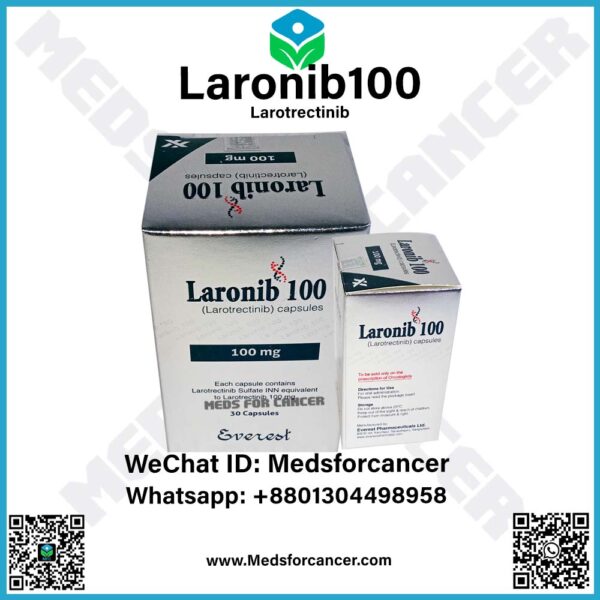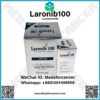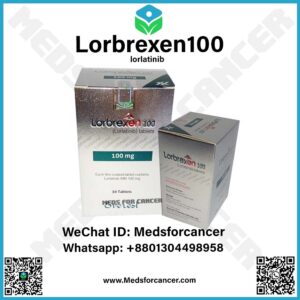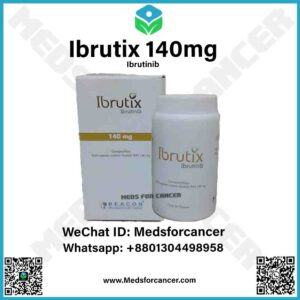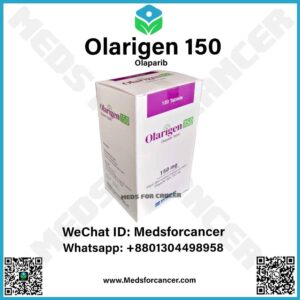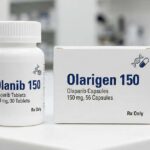Laronib 100 mg (Larotrectinib)
$0.00
Product name: Laronib
Generic name: Larotrectinib
Brand name: Vitrakvi
What is Laronib 100mg (Larotrectinib)?
Laronib 100 mg (Generic Larotrectinib) is a kinase inihibitor, oncologist use this medication to treat cancerous solid tumor that has spread to other parts of the body. Doctors recommend this medication when other treatments including surgery are not possible. Or other treatments did not work well and tumore got worsen. Laronib is used for the adults children and infant of minimum 4 weeks of age and older than that.
Laronib 100 mg is manufactured and marketed by Everest pharmaceutical. Each tablet of laronib capsule contains 100 mg larotrectinib.
How does Laronib 100mg (larotrectinib) work?
This medication targets direct cancer cells that signals cancer cells to spread to the other parts of the body. It is applied when other medications and surgery is not possible to treat the tumor. By targetting cancer cells it inhibits the protein in the cells and shrink the tumor. And this is how it works in patient’s body.
What is the dosage and Administration of administration?
Dosage and administration can be different according to the patient’s health conditions. If the patients is not suffering from any other lethal or crucial disease then they will be recommended by generel dose. Otherwise doctor may prescribe them special dose recommendation or adjust the dose with other medication to reduce the side effects and interactions with other medication.
- The general dose for this medication is 100 mg larotrectinib twice a day with or without food. Continue this schedule if your doctor does not ask you to change or stop the dose.
Follwing administration you may follow while taking laronib.
- Do not break the tablet or do not chew it, swallo the whole tablet with a full glass of water. If you cannot swallow the tablet make a suspension with recommended dose and drink it.
- Do not miss a dose or do not take an over dose. You must inform your doctor when you miss a dose, without their permission do not take over dose.
- Take the medicine at same time every day.
Side effects of laronib 100 mg
Laronib can cause some serious and non-serious side effects. If you are taking laronib you should have concern about the below side effects so that you can inform your doctor as soon as possible.
Some common side effects of Laronib (larotrectinib)
- Nausea
- Vomittinig
- Diarrhea
- Cough
- Stomach pain
- Nasal congestion
- Hedach
- Weight gain
- Muscle weakness
Some serious side effects of laronib
- Dizziness, confusion, Problems with concentration, Difficulty in speaking, Problem in understanding speech.
- Having hallucinations
- Bone abnormality like difficulities in movement
- Shortness of breath
- Swelling in hands, feet, ankles or lower legs.
Take proper Precautions before using Laronib
Taking proper precaution is very necessary when you are taking any therapeutical medicines. Because these medicine can interect with other medicnes and foods. Lets have a look on some precaution that you should take before taking this medicine.
- Tell your doctor, if you have allergy problems. Larotrectinib can increase the risk of allergy in your body.
- Ask your doctor about drug interection of larotrectinib. There are some drugs that interact with larotrectinib that can cause adverse effects in your body, becareful about that.
- Knowing food interaction is also important, because some foods can trigger serious side effects.
- Do not feed breast if your taking this medicine. Chemical component in the medicine can harm your child through breast milk.
- Use proper contraception during physical intimation, while you are taking this medicine.
- Maintain daily routine to get the best result from the medicine.
Larotrectinib price in Bangladesh
The price of larotrectinib in Bangladesh is nearly $400. To know the update price contact with us.

